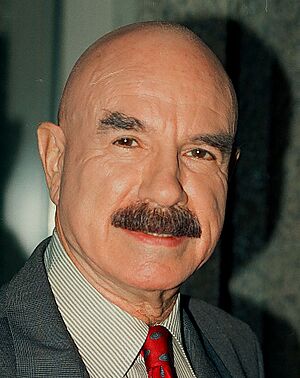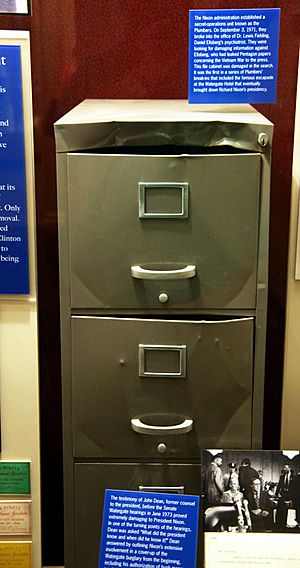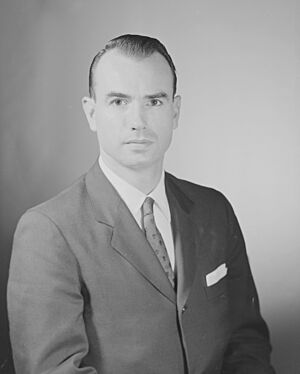G. Gordon Liddy facts for kids
Quick facts for kids
G. Gordon Liddy
|
|
|---|---|

Liddy c. 1998
|
|
| Born |
George Gordon Battle Liddy
November 30, 1930 New York City, U.S.
|
| Died | March 30, 2021 (aged 90) Mount Vernon, Virginia, U.S.
|
| Education | Fordham University (BA, LLB) |
| Political party | Republican |
| Spouse(s) |
Frances Purcell
(m. 1957; |
| Children | 5; including Tom |
| Criminal information | |
| Criminal charge | Conspiracy, burglary, illegal wiretapping |
| Penalty | 20 years imprisonment; commuted to 8 years imprisonment by President Jimmy Carter |
| Military career | |
| Allegiance | |
| Service/ |
|
| Years of service | 1952–1954 |
| Rank | |
George Gordon Battle Liddy (November 30, 1930 – March 30, 2021) was an American lawyer and FBI agent. He became well-known for his part in the Watergate scandal during the time Richard Nixon was president.
Working with E. Howard Hunt, Liddy helped plan and carry out a break-in at the Democratic National Committee offices. This happened in the Watergate building in May and June 1972. After five people involved were caught on June 17, 1972, the Watergate scandal grew. It eventually led to President Nixon leaving office in 1974. Liddy was found guilty of planning the break-in, burglary, and refusing to speak to the Senate committee. He spent almost 52 months in federal prisons.
Later, he debated with Timothy Leary at colleges. He also worked with Al Franken in the late 1990s. Liddy hosted a radio talk show from 1992 until he retired on July 27, 2012. His show was heard on 160 radio stations across the U.S. He also appeared on Fox News Channel and other TV shows.
Contents
Early Life and Education
Growing Up and School
George Gordon Battle Liddy was born in Brooklyn, New York, on November 30, 1930. His father, Sylvester James Liddy, was a lawyer. His mother was Maria Liddy. His family had roots in Ireland and Italy. He was named after a famous lawyer, George Gordon Battle. Liddy grew up in Hoboken, New Jersey and West Caldwell, New Jersey. He went to St. Benedict's Preparatory School in Newark, New Jersey.
College and Military Service
Liddy went to Fordham University and finished in 1952. While there, he was part of the National Society of Pershing Rifles. After college, Liddy joined the United States Army. He served for two years as an artillery officer during the Korean War. He became a first lieutenant. In 1954, he went to Fordham University School of Law. He graduated in 1957 and then worked for the Federal Bureau of Investigation (FBI).
Working for the FBI
Liddy started working for the FBI in 1957. He was first a field agent in Indiana and Denver. In Denver, he made an important arrest on September 10, 1960. He caught Ernest Tait, a criminal who had been on the FBI Ten Most Wanted Fugitives list twice.
At 29, Liddy became the youngest supervisor at FBI headquarters in Washington, D.C. He worked closely with director J. Edgar Hoover. Liddy was known for being a bit reckless among his fellow agents. For example, he was arrested during a secret operation in Kansas City, Missouri. He was later released after calling a former FBI agent. He also did a background check on his future wife before they married.
Liddy left the FBI in 1962. Before leaving, he applied to practice law in different courts. His application to the United States Supreme Court was supported by a top government lawyer, Archibald Cox.
Lawyer and Politician
After leaving the FBI in 1962, Liddy worked with his father as a lawyer in New York City. In 1966, he became a prosecutor in Dutchess County, New York. He led a raid on the Hitchcock Estate in Millbrook, New York, which was then home to Timothy Leary. This case got a lot of attention. Liddy was also told off for firing a gun at the ceiling in a courtroom. In 1969, Liddy led another raid at Bard College. This raid involved Donald Fagen and Walter Becker, who later formed the band Steely Dan. They wrote a song called "My Old School" about the raid.
During this time, Liddy tried to become the District Attorney but did not win. In 1968, he ran for Congress as a Republican. His slogan was "Gordon Liddy doesn't bail them out; he puts them in." He lost a close race. Liddy then accepted a job with the Treasury Department and left the campaign.
After helping Richard Nixon win the presidency in 1968, Liddy got a job in Washington, D.C. He worked on gun control at the United States Department of the Treasury. There, he helped create the country's sky marshal program.
Starting in 1970, he worked as an aide to John D. Ehrlichman in the White House. He also worked for the finance committee of the Committee to Re-elect the President (CRP) from 1971 to 1972. Later, Liddy and others were charged with planning a burglary.
White House Secret Work

In 1971, Liddy moved to Nixon's 1972 re-election campaign. His job was to expand a special White House unit called the "White House Plumbers." This group was formed to stop information from leaking to the press.
At the CRP, Liddy came up with several plans in early 1972. These plans were called "Operation Gemstone." Some of his ideas were very unusual, like kidnapping anti-war protest organizers. Most of Liddy's ideas were turned down by John N. Mitchell, who was the campaign manager. However, some were approved by Nixon's team. This included the 1971 break-in at the office of Daniel Ellsberg's psychiatrist. Ellsberg had shared secret government documents, known as the Pentagon Papers, with The New York Times. At some point, Liddy was told to break into the Democratic National Committee offices at the Watergate Complex.
The Watergate Break-ins
Liddy was the leader of the group of five men who broke into the Democratic National Committee headquarters. This happened at the Watergate Complex. There were at least two separate break-ins in May and June 1972. The burglars were caught on June 17. The goal of the break-ins was to place listening devices and photograph documents. Their first attempt did not work well. Liddy and Hunt planned the break-in from a hotel room near the Watergate building. Liddy said he did not go inside the Watergate Complex during the burglaries. He admitted to overseeing the second break-in from a nearby hotel. Liddy was found guilty of planning the break-in, burglary, and illegal wiretapping.
Liddy was sentenced to 20 years in prison and had to pay $40,000 in fines. He started his prison sentence on January 30, 1973. On April 12, 1977, President Jimmy Carter reduced Liddy's sentence to eight years. Carter said this was to be fair compared to others involved in Watergate. Liddy was released on September 7, 1977. He had served about four and a half years in prison.
After Prison
In 1980, Liddy wrote his autobiography, called Will. It sold over a million copies and was made into a television movie. In the book, he wrote that he was ready to kill during the Ellsberg break-in. He also claimed he planned with Hunt to kill journalist Jack Anderson.
In the early 1980s, Liddy started a private security company. It was called G. Gordon Liddy & Associates.
Liddy began hosting his own talk radio show in 1992. It became very popular and was broadcast across the country. Liddy's show ended on July 27, 2012.
Besides Will, he wrote other non-fiction books. These include When I Was a Kid, This Was a Free Country (2002) and Fight Back! Tackling Terrorism, Liddy Style (2006). He also wrote two novels: Out of Control (1979) and The Monkey Handlers (1990).
Lectures and Acting Career
In the mid-1980s, Liddy started giving lectures. In 1982, The Wall Street Journal listed him as a top speaker at colleges. He later debated with Timothy Leary at colleges. Their debates were called "Nice Scary Guy vs. Scary Nice Guy." Leary had once been called "the most dangerous man in America" by Richard Nixon. These lectures were featured in a 1983 documentary film, Return Engagement.
In 1994, a British documentary series called Watergate interviewed Liddy. He spoke openly about his role in the scandal. He was filmed at home with his large collection of firearms. He talked about being ready to kill Jack Anderson if ordered.
Liddy also acted in several movies, such as Street Asylum and Rules of Engagement. He appeared on TV shows like Airwolf, Fear Factor, and MacGyver. He had regular roles in Miami Vice and Super Force. He was a guest star on Al Franken's LateLine. On April 7, 1986, he was a guest judge at WrestleMania II. In April 1987, he appeared on the game show Super Password.
In Miami Vice, Liddy played William "Captain Real Estate" Maynard. This character was a former secret operations officer. Liddy also co-starred on 18 Wheels of Justice as a crime boss from 2000 to 2001. He appeared on a celebrity episode of Fear Factor in 2006. At 75, Liddy was the oldest person to compete on the show. He won the first two challenges.
Liddy was also interviewed for the 2006 documentary The U.S. vs. John Lennon. He also appeared in TV commercials selling gold.
Personal Life
Liddy was married to Frances Purcell-Liddy for 53 years. She was a teacher and passed away on February 5, 2010. They had five children: Thomas, Alexandra, Grace, James, and Raymond.
In his later years, Liddy was against animal experimentation.
Death
G. Gordon Liddy died on March 30, 2021, at the age of 90. He passed away at his daughter's house in Fairfax County, Virginia. He had been suffering from Parkinson's disease.
Portrayals in Media
- In the 1979 TV show Blind Ambition, Liddy was played by William Daniels.
- Robert Conrad played Liddy in the 1982 TV movie, Will: G. Gordon Liddy, which was based on Liddy's own book.
- Comic book writer Alan Moore said that the character of The Comedian from his graphic novel Watchmen was partly based on Liddy.
- John Diehl played him in Oliver Stone's movie Nixon (1995).
- Harry Shearer played Liddy in the comedy movie Dick (1999).
- In Gaslit, Liddy was played by Shea Whigham.
- The HBO series White House Plumbers features Liddy, played by Justin Theroux.
See also
 In Spanish: G. Gordon Liddy para niños
In Spanish: G. Gordon Liddy para niños
- List of people pardoned or granted clemency by the president of the United States
 | Toni Morrison |
 | Barack Obama |
 | Martin Luther King Jr. |
 | Ralph Bunche |


